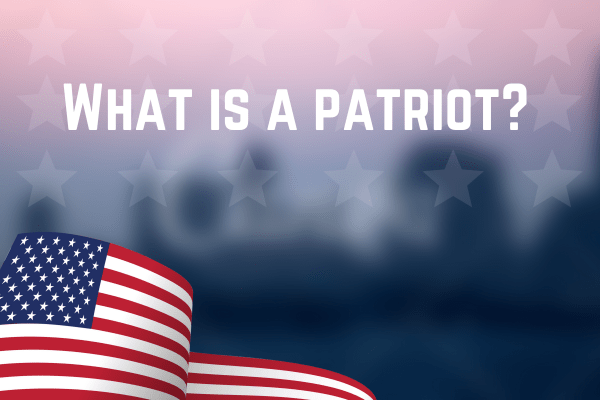The word “Patriot” has been used in America since the beginning of our nation. We often think of “patriots” as people who love their country and take pride in citizenship. Look to Mel Gibson’s character in the movie The Patriot or Marvel’s Captain America for patriots who use their bravery and strength to protect their country. Yet, throughout history, patriot has also taken on negative tones. Consider the anti-government Patriot Movement of the 1980’s and 90’s to see how patriotism can go awry. Today, we who pay attention to the news notice that patriot remains a word with the power to unify or divide.
Etymology of patriot
Patriot comes from the Greek words patriotes, “fellow countryman,” patrios “of one’s fathers,” and patris “fatherland.” It entered English use in the 16th century via the French word patriote, meaning “countryman” or “compatriot.” Shortly thereafter, in the 1600s, political unrest characterized Western Europe as Protestants and Catholics battled for power. Often, the adjective “good” was used before patriot to clarify when someone was on the correct side of a political divide. Whether or not you were a “good patriot” depended on which side you were on and who was judging your worthiness.
History of use
Later, in the 17th century, patriot became a term of ridicule or abuse. It took on the derogatory sense of someone who claims to support his country but actually does not. A patriot was someone who was disloyal, who had partisan desires to upset the established government.
Therefore, it should be no surprise that American colonists and writers of the 18th century welcomed the term patriot to describe the people fighting against the tyranny of the British monarchy. Note, the British rarely referred to the colonists as patriots. Instead, they called them rebels or “the rabble.” After the American Revolution, thanks to the success of the war, patriot returned to its original meaning, with a positive connotation, of a fellow countryman.
Things turned divisive again in the 1850s, when some Americans resented the influx of immigrants into the United States. Patriot appeared in nationalistic hate speech and in the rhetoric of the Know Nothing Party. This political organization and its supporters saw external influences and immigrants as a threat to American values. In that era, a patriot named someone who put America first before all other concerns. This promoted an “us versus them” mentality.
Some semblance of this meaning of patriot persisted into the 20th century. The Patriot Movement of the 1980s and 90s promoted the idea that any person or organization who didn’t embrace America First values was considered a threat. And that threat could include the United States Government. The Patriot Movement spawned a rise in state militias and anti-government rhetoric. Timothy McVeigh and Terry Nichols supported The Patriot Movement. They were both convicted of involvement in the Oklahoma City Bombing of 1995, the deadliest act of terrorism in American history. And as recently as 2021, the men and women who stormed and vandalized the Capitol in Washington, DC on January 6th, were called patriots by President Donald Trump.
Modern use
In its 2005 revisions, the Oxford English Dictionary included one entry for the definition of patriot that says, “an opponent of presumed intervention by the federal government in affairs of individuals, especially with respect to gun and tax laws. Frequently in the names of libertarian political and militia groups.” When asked about this definition, the editors of the OED said they added the entry based on current use.
In September 2025, on the podcast “The Opinions” from The New York Times, director Ken Burns discussed his upcoming documentary The American Revolution. Among other things, the film grapples with the notion of what a patriot is. According to Burns, a patriot is a “lover of constitutional liberty.” Burns said in the interview that he wants “patriot” to be a word all Americans can find a place in. After learning about the controversial history behind this term, I think that’s a lofty aspiration. But I share the hope that Americans can return to using the word patriot as a positive force for hope and unification.
What are your thoughts on the word patriot? Tell me in the comments.
Thanks for getting nerdy with me!




I had no idea “patriot” was such a divisive word. I’ve always associated it with the 4th of July and the Lee Greenwood song “God Bless the USA,” particularly the part where he sings ” . . . and I’m proud to be an American.” I never read any deeper into the term!